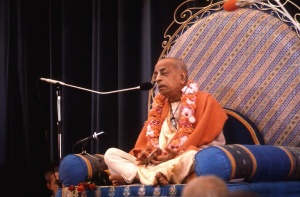SB 7.15.30: Difference between revisions
m (1 revision(s)) |
No edit summary |
||
| Line 1: | Line 1: | ||
{{info | {{info | ||
|speaker= | |speaker=Nārada Muni | ||
|listener=King | |listener=King Yudhiṣṭhira | ||
}} | }} | ||
[[Category:Srimad-Bhagavatam - Canto 07 Chapter 15]] | |||
[[Category:Bhagavatam Verses Spoken by Narada Muni - Vanisource|071530]] | |||
<div style="float:left">'''[[Srimad-Bhagavatam]] - [[SB 7|Seventh Canto]] - [[SB 7.15: Instructions for Civilized Human Beings|Chapter 15: Instructions for Civilized Human Beings]]'''</div> | |||
<div style="float:right">[[File:Go-previous.png|link=SB 7.15.29]] '''[[SB 7.15.29]] - [[SB 7.15.31]]''' [[File:Go-next.png|link=SB 7.15.31]]</div> | |||
{{RandomImage}} | |||
==== TEXT 30 ==== | ==== TEXT 30 ==== | ||
<div | <div class="verse"> | ||
yaś citta-vijaye yattaḥ | :yaś citta-vijaye yattaḥ | ||
syān niḥsaṅgo 'parigrahaḥ | :syān niḥsaṅgo 'parigrahaḥ | ||
eko vivikta-śaraṇo | :eko vivikta-śaraṇo | ||
bhikṣur bhaikṣya-mitāśanaḥ | :bhikṣur bhaikṣya-mitāśanaḥ | ||
</div> | </div> | ||
| Line 17: | Line 22: | ||
==== SYNONYMS ==== | ==== SYNONYMS ==== | ||
<div | <div class="synonyms"> | ||
''yaḥ''—one who; ''citta-vijaye''—conquering the mind; ''yattaḥ''—is engaged; ''syāt''—must be; ''niḥsaṅgaḥ''—without contaminated association; ''aparigrahaḥ''—without being dependent (on the family); ''ekaḥ''—alone; ''vivikta-śaraṇaḥ''—taking shelter of a solitary place; ''bhikṣuḥ''—a renounced person; ''bhaikṣya''—by begging alms just to maintain the body; ''mita-aśanaḥ''—frugal in eating. | |||
</div> | </div> | ||
| Line 24: | Line 29: | ||
==== TRANSLATION ==== | ==== TRANSLATION ==== | ||
<div | <div class="translation"> | ||
One who desires to conquer the mind must leave the company of his family and live in a solitary place, free from contaminated association. To maintain the body and soul together, he should beg as much as he needs for the bare necessities of life. | One who desires to conquer the mind must leave the company of his family and live in a solitary place, free from contaminated association. To maintain the body and soul together, he should beg as much as he needs for the bare necessities of life. | ||
</div> | </div> | ||
| Line 31: | Line 36: | ||
==== PURPORT ==== | ==== PURPORT ==== | ||
<div | <div class="purport"> | ||
This is the process for conquering the agitation of the mind. One is recommended to take leave of his family and live alone, maintaining body and soul together by begging alms and eating only as much as needed to keep himself alive. Without such a process, one cannot conquer lusty desires. Sannyāsa means accepting a life of begging, which makes one automatically very humble and meek and free from lusty desires. In this regard, the following verse appears in the Smṛti literature: | This is the process for conquering the agitation of the mind. One is recommended to take leave of his family and live alone, maintaining body and soul together by begging alms and eating only as much as needed to keep himself alive. Without such a process, one cannot conquer lusty desires. ''Sannyāsa'' means accepting a life of begging, which makes one automatically very humble and meek and free from lusty desires. In this regard, the following verse appears in the ''Smṛti'' literature: | ||
''dvandvāhatasya gārhasthyaṁ'' | |||
''dhyāna-bhaṅgādi-kāraṇam'' | |||
''lakṣayitvā gṛhī spaṣṭaṁ'' | |||
''sannyased avicārayan'' | |||
In this world of duality, family life is the cause that spoils one's spiritual life or meditation. Specifically understanding this fact, one should accept the order of sannyāsa without hesitation. | In this world of duality, family life is the cause that spoils one's spiritual life or meditation. Specifically understanding this fact, one should accept the order of ''sannyāsa'' without hesitation. | ||
</div> | </div> | ||
__NOTOC__ | |||
<div style="float:right; clear:both;">[[File:Go-previous.png|link=SB 7.15.29]] '''[[SB 7.15.29]] - [[SB 7.15.31]]''' [[File:Go-next.png|link=SB 7.15.31]]</div> | |||
__NOTOC__ | |||
__NOEDITSECTION__ | |||
Revision as of 04:26, 13 June 2021

A.C. Bhaktivedanta Swami Prabhupada
TEXT 30
- yaś citta-vijaye yattaḥ
- syān niḥsaṅgo 'parigrahaḥ
- eko vivikta-śaraṇo
- bhikṣur bhaikṣya-mitāśanaḥ
SYNONYMS
yaḥ—one who; citta-vijaye—conquering the mind; yattaḥ—is engaged; syāt—must be; niḥsaṅgaḥ—without contaminated association; aparigrahaḥ—without being dependent (on the family); ekaḥ—alone; vivikta-śaraṇaḥ—taking shelter of a solitary place; bhikṣuḥ—a renounced person; bhaikṣya—by begging alms just to maintain the body; mita-aśanaḥ—frugal in eating.
TRANSLATION
One who desires to conquer the mind must leave the company of his family and live in a solitary place, free from contaminated association. To maintain the body and soul together, he should beg as much as he needs for the bare necessities of life.
PURPORT
This is the process for conquering the agitation of the mind. One is recommended to take leave of his family and live alone, maintaining body and soul together by begging alms and eating only as much as needed to keep himself alive. Without such a process, one cannot conquer lusty desires. Sannyāsa means accepting a life of begging, which makes one automatically very humble and meek and free from lusty desires. In this regard, the following verse appears in the Smṛti literature:
dvandvāhatasya gārhasthyaṁ
dhyāna-bhaṅgādi-kāraṇam
lakṣayitvā gṛhī spaṣṭaṁ
sannyased avicārayan
In this world of duality, family life is the cause that spoils one's spiritual life or meditation. Specifically understanding this fact, one should accept the order of sannyāsa without hesitation.